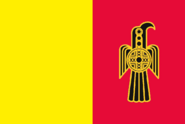Aováili vánši
|
| Luthic |
|---|
| Lûthica |  Flag of the Luthic-speaking Ravenna | | Pronunciation | [ˈlu.ti.xɐ] |
|---|
| Created by | Lëtzelúcia |
|---|
| Date | 2023 |
|---|
| Setting | Alternative history Italy |
|---|
| Native to | Ravenna; Ferrara and Bologna |
|---|
| Ethnicity | Luths |
|---|
| Native speakers | 149,500 (2020) |
|---|
| |
|---|
Early forms | |
|---|
Standard form | Standard Ravennese Luthic (Lûthica)
|
|---|
Dialects |
- Upper Luthic (Altalûthica), Ferraresi Luthic (Lûthica Estense)
- Standard Bolognese Luthic (Lûthica Bolognesa)
- Paulistan Luthic (Lûthica Paülista)
|
|---|
|
|
|---|
| Official status |
|---|
Recognised minority
language in | |
|---|
| Regulated by | Council for the Luthic Language |
|---|
| Language codes |
|---|
| CLCR | qlu |
|---|
| BRCL | luth |
|---|
The areas where Luthic (red and orange) is spoken. | | This article contains IPA phonetic symbols. Without proper rendering support, you may see question marks, boxes, or other symbols instead of Unicode characters. For an introductory guide on IPA symbols, see Help:IPA. |
Luthic (/ˈluːθ.ɪk/ LOOTH-ik; endonym: Lûthica [ˈlu.ti.xɐ]) is an Italic language that is spoken by the Luths, with strong East Germanic influence. Unlike other Romance languages, such as Portuguese, Spanish, Catalan, Occitan and French, Luthic has a large inherited vocabulary from East Germanic, instead of only proper names that survived in historical accounts, and loanwords. About 250,000 people speak Luthic worldwide.
Luthic is the result of a prolonged contact among members of both regions after the Gothic raids towards the Roman Empire began, together with the later West Germanic merchants’ travels to and from the Western Roman Empire. These connections, the interactions between the Papal States and the conquest by the Germanic dynasties of the Roman Empire slowly formed a creole as a lingua franca for mutual communication.
As a standard form of the Gotho-Romance language, Luthic has similarities with other Italo-Dalmatian languages, Western Romance languages and Sardinian. The status of Luthic as the regional language of Ravenna and the existence there of a regulatory body have removed Luthic, at least in part, from the domain of Standard Italian, its traditional Dachsprache. It is also related to the Florentine dialect spoken by the Italians in the Italian city of Florence and its immediate surroundings.
Luthic is an inflected fusional language, with four cases for nouns, pronouns, and adjectives (nominative, accusative, genitive, dative); three genders (masculine, feminine, neuter); and two numbers (singular, plural).
Previously featured languages • Nominate a featured language |
ISO codes on KreativeKorp
|
The Linguifex wiki supports KreativeKorps initiative on assigning ISO-codes for conlangs, the ConLang Code Registry! Add your language to the list here. If your language is on Linguifex, let us know! |
Žókkoto
|
- Not sure where to start?
- Adding content
- If you want to help but you're not sure where to start, try improving the various stub articles by expanding them.
- Add a new, needed category.
- Another helpful activity would be to check the list of wanted pages for frequently linked-to articles that don't exist yet.
- Providing linguistic and phonetic information.
- You can find a list of needed templates here.
- Wiki maintenance
|
|
|
Linguifeks
|
Remmís wíkinól ás htóiskalaj hléraneu li áltoðeu elentánšive. Elentánšif általossa xáirremmísnoiakku sóntaslu: gottilónt, naissáitvant, šiánty li hywihûn. Dvénisóswin elentubídasto li láessa elentýissa losínos. Elentášif énnos ugój mihhílla ǿhhēðava, ohéj góttara tántiou sálja!
Aurôlesteko Linguifekser!
|
Aováili víhy
|
|
|
Áltanar vánšida!
|
Vánšida áltanallúnei? Wárij nóntau si šíllallés te neaváttavýn, târ eaéama kwáoisóswin! Távǿn mø nîuvvánšida maiáoisás pólla:
- jônseit - jôma vánšide,
- sesié - ƕáhkē vánšide,
- siélj - siéhta li siehnár vánšide.
Néjvátrakala ksiéllara glódda általnójlán nîuvvánšide.
<createbox>
break=no
preload=Template:New/Language
buttonlabel=Áltanar kóivvánšida léj!
</createbox>
Sénynnave hûn vánseituki mø kváttar njôssellésteu li vánseitello šárēgeu.
|
Áltanar siéhteu!
|
Linguifex houses not just your language, but a dictionary similar to Wiktionary, namely, Contionary. Here you can create and share the vocabulary and details of your constructed language! Write your word (no capitals) and get going!
For more information on the Contionary, see our words and introduction!
|
|